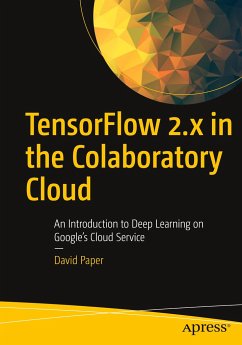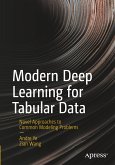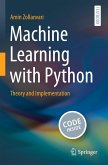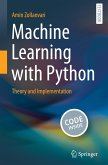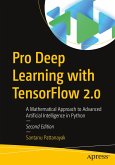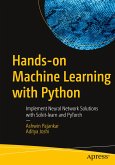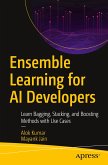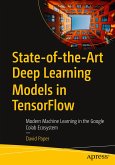Use TensorFlow 2.x with Google's Colaboratory (Colab) product that offers a free cloud service for Python programmers. Colab is especially well suited as a platform for TensorFlow 2.x deep learning applications. You will learn Colab's default install of the most current TensorFlow 2.x along with Colab's easy access to on-demand GPU hardware acceleration in the cloud for fast execution of deep learning models. This book offers you the opportunity to grasp deep learning in an applied manner with the only requirement being an Internet connection. Everything else-Python, TensorFlow 2.x, GPU support, and Jupyter Notebooks-is provided and ready to go from Colab.
The book begins with an introduction to TensorFlow 2.x and the Google Colab cloud service. You will learn how to provision a workspace on Google Colab and build a simple neural network application. From there you will progress into TensorFlow datasets and building input pipelines in support of modeling and testing. You will find coverage of deep learning classification and regression, with clear code examples showing how to perform each of those functions. Advanced topics covered in the book include convolutional neural networks and recurrent neural networks.
This book contains all the applied math and programming you need to master the content. Examples range from simple to relatively complex when necessary to ensure acquisition of appropriate deep learning concepts and constructs. Examples are carefully explained, concise, accurate, and complete to perfectly complement deep learning skill development. Care is taken to walk you through the foundational principles of deep learning through clear examples written in Python that you can try out and experiment with using Google Colab from the comfort of your own home or office.
What You Will LearnBe familiar with the basic concepts and constructs of applied deep learningCreate machine learning models with clean and reliable Python codeWork with datasets common to deep learning applicationsPrepare data for TensorFlow consumptionTake advantage of Google Colab's built-in support for deep learningExecute deep learning experiments using a variety of neural network modelsBe able to mount Google Colab directly to your Google Drive accountVisualize training versus test performance to see model fit
Who This Book Is For
Readers who want to learn the highly popular TensorFlow 2.x deep learning platform, those who wish to master deep learning fundamentals that are sometimes skipped over in the rush to be productive, and those looking to build competency with a modern cloud service tool such as Google Colab
The book begins with an introduction to TensorFlow 2.x and the Google Colab cloud service. You will learn how to provision a workspace on Google Colab and build a simple neural network application. From there you will progress into TensorFlow datasets and building input pipelines in support of modeling and testing. You will find coverage of deep learning classification and regression, with clear code examples showing how to perform each of those functions. Advanced topics covered in the book include convolutional neural networks and recurrent neural networks.
This book contains all the applied math and programming you need to master the content. Examples range from simple to relatively complex when necessary to ensure acquisition of appropriate deep learning concepts and constructs. Examples are carefully explained, concise, accurate, and complete to perfectly complement deep learning skill development. Care is taken to walk you through the foundational principles of deep learning through clear examples written in Python that you can try out and experiment with using Google Colab from the comfort of your own home or office.
What You Will LearnBe familiar with the basic concepts and constructs of applied deep learningCreate machine learning models with clean and reliable Python codeWork with datasets common to deep learning applicationsPrepare data for TensorFlow consumptionTake advantage of Google Colab's built-in support for deep learningExecute deep learning experiments using a variety of neural network modelsBe able to mount Google Colab directly to your Google Drive accountVisualize training versus test performance to see model fit
Who This Book Is For
Readers who want to learn the highly popular TensorFlow 2.x deep learning platform, those who wish to master deep learning fundamentals that are sometimes skipped over in the rush to be productive, and those looking to build competency with a modern cloud service tool such as Google Colab

